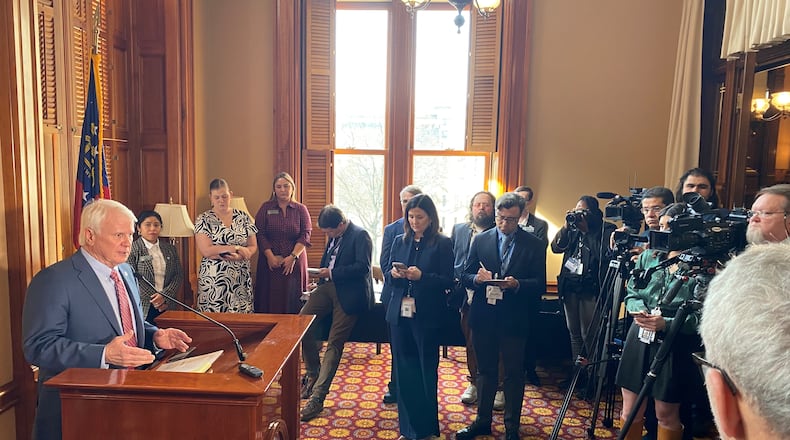The conversation about full Medicaid expansion in Georgia is inching from the shadows into the open.
On Wednesday, Georgia House Speaker Jon Burns faced reporters’ questions in his annual press conference laying out his priorities for the upcoming legislative session. And in response to a question about the argument for Medicaid expansion, he didn’t dodge.
“I’m encouraged that we’re looking at the facts that surround expansion,” Burns said.
Medicaid is the government-funded health insurance program for poor children and some poor adults. Georgia is one of only 10 states that have not expanded Medicaid to cover all its poor adults.
Georgia GOP leaders have spent more than a decade spurning talk of full Medicaid expansion, which was a key initiative of former President Barack Obama.
This year, though, House GOP leaders sent signals that they were interested in the idea of expanding Medicaid in exchange for a deal to roll back regulations that protect hospitals from competition, called Certificate of Need. In a House committee hearing in November on the Certificate of Need system, the surprise speakers list included Medicaid expansion experts from Arkansas and other GOP-friendly states. Speaker Burns showed up in person to watch.
But he wouldn’t say so. Asked repeatedly by an AJC reporter as he walked to the elevator, he simply repeated that he was there to hear about Certificate of Need.
By Wednesday that had changed. Burns spoke at a major legislative breakfast Wednesday morning saying that “When it comes to healthcare, there has certainly been a lot of discussion of late about Medicaid expansion. Expanding access to care for low-income working families through a private option — in a fiscally responsible way that lowers premiums — is something we will continue to gather facts on.”
Georgia Medicaid covers certain categories of poor adults, including many elderly people in nursing homes, some disabled, and others. They cover a small fraction of the state’s poor adults, and partly as a result, Georgia has the nation’s third highest uninsured rate, according to the nonprofit health research organization KFF.
Instead of full Medicaid expansion, Gov. Brian Kemp and GOP leaders on July 1 launched Georgia Pathways, a limited expansion of Medicaid to those who perform certain state-specified activities at least 80 hours per month. Those may include working a job, working for a registered nonprofit, or higher education. Caretaking for an elderly relative would not qualify, and being disabled but not government-certified as disabled would not qualify a person.
The Pathways results so far have been anemic. Out of 370,000 Georgians that Kemp’s office says could be eligible, just 2,344 enrolled as of Dec. 15, according to the Georgia Department of Community Health. An examination by the AJC showed the Medicaid eligibility signup system is all but broken.
Another potential impact of Medicaid expansion is it could bolster the finances of safety-net hospitals who currently treat large numbers of uninsured poor. Fulton County said this week that if Medicaid were expanded in the state they would be able to pull back on subsidizing Grady Memorial Hospital. Fulton County sends Grady more than $40 million per year.
Burns allies have previously said that Pathways must be given time to work. Although Burns spoke of interest in Medicaid expansion, he also said Wednesday that Kemp’s Pathways program was “working.”
Asked if it was successful, he deflected.
“It’s moving in the right direction,” he said.
About the Author
Keep Reading
The Latest
Featured




